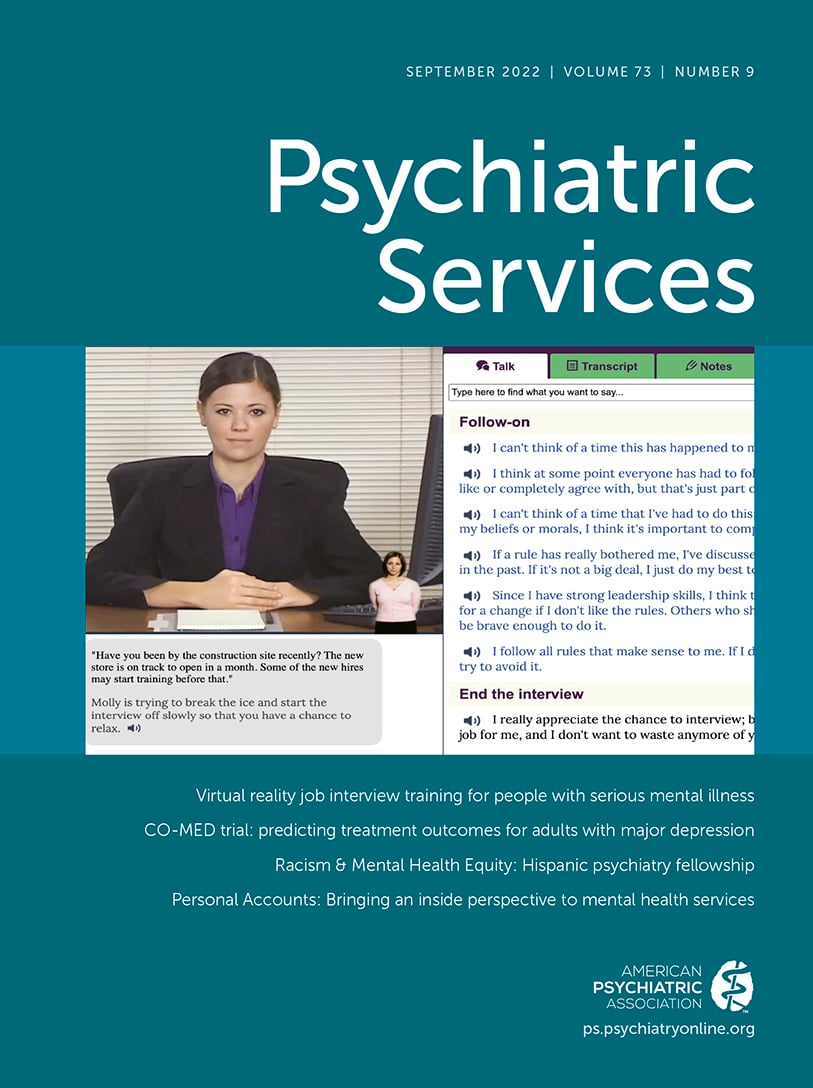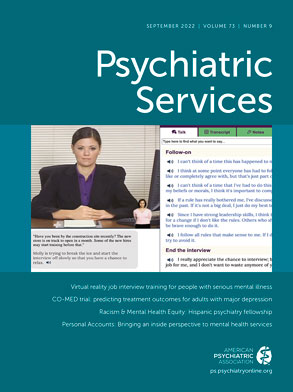Thirty years ago, many schizophrenia research and treatment programs refocused their attention to the earliest phases of psychosis. The ensuing framework emphasized early detection and preventive intervention when symptoms first appear. Accumulating evidence has since shown that prompt intervention at the onset of psychosis, with services designed specifically for persons with early phase illness, leads to better outcomes (
1). Contemporary early intervention programs offer multimodal treatment featuring psychopharmacology alongside psychosocial interventions, including cognitive and behavioral therapy, supported employment and education, family support, and case management that is coordinated by a single care team. In this Viewpoint we describe the development of a national early psychosis learning health care partnership, key features of this practice-oriented research initiative, and future directions for leveraging this framework to implement, adapt, and sustain evidence-based interventions for early psychosis in routine care settings.
Foundational Initiatives Supporting Learning Health Care in Early Psychosis
In the United States, the Recovery After an Initial Schizophrenia Episode (RAISE) initiative of the National Institute of Mental Health (NIMH) established the feasibility and effectiveness of a multicomponent, person-centered, and team-based intervention for reducing symptoms and improving functioning among youths and young adults experiencing an initial episode of psychosis (
2). Research findings on the comparative effectiveness and implementation of RAISE catalyzed investment of federal and state governments in early intervention services, transforming the treatment of schizophrenia in the United States (
3). Today, >360 publicly funded coordinated specialty care (CSC) programs for first-episode psychosis (FEP) operate in all 50 states, serving tens of thousands of adolescents and young adults each year.
The large number of similarly configured CSC programs—that is, programs characterized by a recovery orientation, evidence-based interventions, multidisciplinary clinical teams, collaborative treatment planning, and data-informed care—present a unique opportunity to study adoption, adaptation, and innovation in evidence-based care for FEP. NIMH has long encouraged large-scale, multisite approaches to research into the earliest phases of serious mental illness (
4). With the nationwide implementation of CSC, NIMH has reimagined collaborative clinical research for early psychosis within a learning health care (LHC) framework. That is, systems of care that align evidence-based practice, standardized clinical assessment, medical informatics, large-scale data analysis, and active stakeholder involvement in the continuous improvement of services and participation in practice-oriented research (
5).
With few previous examples of LHC use in mental health, NIMH established the basis for LHC through a series of bootstrapping activities, often in collaboration with other government agencies, nonprofit foundations, and patient and family advocacy organizations. Between 2014 and 2017, early intervention training events, educational webinars, conference presentations, listening sessions, site visits, and multidisciplinary working groups engaged clinical providers, program administrators, service users, family members, scientists, and federal and state mental health authorities in a deliberative process to operationalize LHC principles and define best practices. NIMH fostered a culture of collaboration among these diverse stakeholders and nurtured a fledgling early psychosis learning community. The aims were to select meaningful clinical measures that balance psychometric rigor and practicality, identify novel data capture technologies to minimize assessment burden, find informatics solutions to establish large interoperable data sets, and promote advanced program evaluation and clinical trial designs to test the effectiveness of FEP services.
Regional Learning Health Care Networks
Building on this foundation, NIMH proposed the Early Psychosis Intervention Network (EPINET) in 2018, a practice-oriented research initiative designed to advance LHC methods in early psychosis treatment. Today, NIMH supports eight EPINET regional networks. Each network includes a scientific hub, connected CSC programs, and an executive committee that includes service users, frontline clinicians, program administrators, and researchers. Executive committees ensure alignment of clinical and scientific goals among network stakeholders and facilitate meaningful innovations in clinical assessment, data sharing, and performance reporting. Individual networks bring unique perspectives to the national LHC experiment, which reflect the concerns and creativity of local partners. Accordingly, EPINET tests multiple approaches for addressing common challenges such as integrating systematic data collection into routine care; assembling large-scale clinical data sets from real-world treatment settings; applying advanced analytics to study implementation, adaptation, and effectiveness of evidence-based interventions; employing intuitive data visualization tools; and rapidly disseminating new knowledge to network stakeholders. In all, EPINET comprises 101 community-based programs, representing more than a quarter of publicly funded CSC programs in the United States.
LHC systems feature science-to-service and service-to-science cycles that promote, investigate, and refine best practices over time. To accelerate this process, each EPINET regional hub includes one or more practice-oriented research projects that will advance knowledge about FEP populations, interventions, or recovery outcomes. To the greatest extent possible, the hubs’ research projects are embedded into routine care and leverage data collected during clinical encounters. Areas of active investigation include reducing the duration of untreated psychosis, decreasing substance and alcohol misuse, preventing suicide, improving cognition and motivation, testing telehealth delivery of CSC, and improving long-term outcomes for clinically heterogeneous and racially and ethnically diverse populations.
Common Measures, Data Sharing, and National Collaboration
Each regional network collects CSC participant and program data from hundreds of FEP patients. Across networks, several thousand individuals with affective or nonaffective FEP will be followed up longitudinally; programs offering services to youths at clinical high risk for psychosis may include those persons whose data are in LHC data sets. The EPINET National Data Coordinating Center (ENDCC) has been established to combine regional data sets into a national repository of early psychosis clinical measures, assessment and intervention strategies, and deidentified person-level data from patients receiving CSC services nationwide (
https://nationalepinet.org).
The ENDCC enhances and magnifies regional networks’ efforts in several ways. For example, from 2019 to 2021, the ENDCC convened hub leaders in a review of common measures used within networks for assessing the psychopathology, interventions, and treatment responses of individuals with early psychosis. The ENDCC identified opportunities to harmonize measures across networks; through consensus building, it developed a patient-level Core Assessment Battery (CAB) that covers 21 domains deemed important for “best practice” FEP programs (
https://nationalepinet.org/core-assessment-battery-cab). Planned analyses of shared data will establish overall CSC performance metrics, and confidential dashboards will compare each program’s operations relative to national norms, providing meaningful benchmarks for local quality assurance efforts. The complementary program-level CAB collects administrative information valued by policy makers to better understand the CSC workforce, service capacity, funding streams, and other contextual factors that may influence treatment quality and effectiveness. Collecting this administrative data streamlines performance reporting to funding agencies and, when combined with patient-level data, can encourage data-informed policy research. Finally, the ENDCC is forging links across scientific projects to accelerate large-scale research into CSC service delivery models, moderators of treatment effectiveness, and personalization of care.
Future Directions
Looking ahead, the ENDCC is expanding LHC opportunities beyond the EPINET founder networks. A Web-based version of the CAB facilitates data collection in CSC programs outside of EPINET and provides open access to program management tools, performance reports, and research findings. Adding an additional cohort of CSC programs, including those that offer early intervention services to persons with clinical high risk, will increase statistical power for LHC analyses and hasten broader implementation of data-driven mental health care in U.S. community clinics. ENDCC infrastructure will also facilitate prospective clinical research on early psychosis risk factors, mechanisms of illness progression, and novel treatment targets and interventions. Integrating translational science perspectives is a natural progression toward the LHC goal of practice-oriented studies that improve patient care and drive the process of scientific discovery (
5).
EPINET represents the most comprehensive U.S. example of a practice-based initiative to implement, adapt, and sustain evidence-based interventions for early psychosis in routine care settings. It is the first LHC system for serious mental illness that emphasizes standardized data collection and analytics to support program management and scientific discovery on a national scale. EPINET is informed by pioneering efforts in other countries that integrate early intervention programs within regional or national health systems, with practice-based research to speed up access to services, maintain fidelity to evidence-based practices, and improve long-term outcomes (
6). Rapid learning health care systems are underway in other nations (e.g.,
https://aepcc.org.au), with structures, processes, and goals similar to those of EPINET (
7). NIMH aspires to future collaborations with international partners to establish common goals and benchmarks necessary for delivering high-quality, continuously improving, and sustainable mental health care for persons experiencing early psychosis and to launch second-generation initiatives in order to achieve effective learning in mental health care for all.

